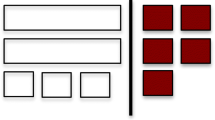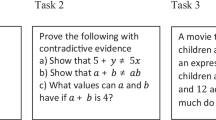Abstract
On repeated occasions, observational learning has proved itself to be an effective instruction method. Experimental studies have shown to be effective for complex tasks such as reading and writing for both teachers and students as models. The problem when interpreting the results of such research is that, in observation tasks, several mental activities play a simultaneous role. In this study we therefore set out to identify the effective elements of observation tasks. We focused on two elements of the observation tasks, both aimed at stimulating monitoring activities: evaluation of the model’s performance and elaboration on this evaluation. We have also distinguished between elaboration on the observed products (the models’ written answers), and elaboration on the observed processes (the models’ verbalisations of their mental activities).
The data were subjected to a LISREL analysis. First of all, it was observed that subjects who performed “evaluation” and “productelaboration” better, and “process-elaboration” more often in one lesson, also performed these activities better or more often in the subsequent lesson. Next, we observed an effect of aptitude on the learning activities: pre skill scores influence “evaluation” and “product-elaboration”. The most important finding is that “evaluation” and “product-elaboration” contribute positively to argumentative writing skills. It is discussed that these findings confirm the importance of the monitoring, evaluative and reflective activities when learning complex tasks as writing.
Résumé
Comparativement à l’apprentissage par l’action, la méthode d’apprentissage par l’observation c’est plus efficace. On sait queles études expérimentales s’appliquent bien à destâches complexes comme la lecture et la production écrite, à la fois chez les enseignants et chez les élèves, pris comme modèles. Portant l’interprétation des résultats expérimentaux pose un problème puis que dans les tâches d’observation, plusieurs activités interviennent simultanément. Dans la présente étude, nous voulons identifier les éléments réellement critiques dans ces tâches d’observation. Nous nous sommes intéressés à deux d’entre eux: ‘l’évaluation’ et ‘l’élaboration’ (du ‘produit’ et du ‘processus’).
Pour le traitement des donées nous avons utilisée par la méthode LISREL. En premier lieu, les sujets qui, dans une première leçon, réalisent plus souvent correctement les activités d’apprentissage ‘évaluation’ et ‘élaboration du produit’, et réalisent plus souvent ‘élaboration du processus’, réussissent de la même façon dans le leçon suivante. En outre, nous avons constaté quel’existe un effet d’aptitude: les aptitudes établies préalablement influencent ‘l’évaluation’ et ‘l’élaboration du produit’. Le plus important résultat c’est des effets positifs de ‘l’évaluation’ et de ‘l’élaboration du produit’ sur les performances d’écrire argumentatives. Ce résultat confirme l’importance des activités monitor, évaluation et réflexion pendant l’apprentissage des taches complexes comme écrire.
Similar content being viewed by others
References
Bandura, A. (1986).Social foundations of thought and action: A social cognitive theory. Englewood Cliffs, NJ: Prentice Hall.
Bandura, A. (1997).Self-efficacy. The exercise of control. New York: W.H. Freeman and Company.
Bollen, K.A. (1989).Structural equations with latent variables. New York: John Wiley.
Braaksma, M.A.H., & Rijlaarsdam, G. (1997).Learning to write and read argumentative texts by observation. An explorative study on effective learning activities in observation tasks. Paper presented at the 7th European Conference for Research on Learning and Instruction, Athens, Greece.
Collins, A., Brown, B.S., & Newman, S.E. (1989). Cognitive apprenticeship: Teaching the crafts of reading, writing and mathematics. In L.B. Resnick (Ed.),Knowledge, learning and instruction. Essays in honor of Robert Glaser (pp. 453–494). Hillsdale, NJ: Erlbaum.
Cook, Th., & Campbell, D.T. (1979).Quasi Experimentation: Design and analysis issues for field settings. Chicago: Rand McNally College Pub.
Couzijn, M.J. (1995).Observation of writing and reading activities. Effects on learning and transfer. Unpublished dissertation. University of Amsterdam.
Couzijn, M. (1999). Learning to write by observation of writing and reading processes: Effects on learning and transfer.Learning and Instruction, 2, 109–142.
Couzijn, M., & Rijlaarsdam, G. (1996). Learning to read and write argumentative text by observation. In G. Rijlaarsdam, H. van den Bergh, & M. Couzijn (Eds.),Current trends in writing research: Effective teaching and learning of writing (pp. 253–272). Amsterdam: Amsterdam University Press.
Graham S., & Harris, K.R. (1994). The role and development of self-regulation in the writing process. In D.H. Schunk & B.J. Zimmerman. (Eds.),Self-regulation of learning and performance: Issues and, educational applications (pp. 203–228), Hillsdale, NJ: Erlbaum.
Graham, S., Harris, K.A., & Troia, G.A. (1998). Writing and self-regulation: Cases from the self-regulated strategy development model. In D.H. Schunk & B.J. Zimmerman (Eds.),Self-regulated learning, from teaching to self-reflective practice (pp. 20–41). New York: The Guilford Press.
Hayes, J.R. (1996). A new framework for understanding cognition and affect in writing. In C.M. Levy & S. Ransdell (Eds.),The science of writing: Theories, methods, individual differences and applications (p. 1–27), Hillsdale, NJ: Erlbaum.
Hillocks, G. (1986).Research on written composition: New directions for teaching. Urbana, Ill: ERIC Clearinghouse on Reading and Communication Skills, National Institute of Education.
Jöreskog, K.G., & Sörbom, D. (1993).LISREL 8: Structural equations modeling with the SIMPLIS command language. Hillsdale, NJ: Erlbaum.
Kellogg, R.T. (1994).Psychology of writing. New York: Oxford University Press.
Lysynchuk, L.M., Pressley, M., d’Ailly, H., Smith, M., & Cake, H. (1989). A methodological analysis of experimental studies of comprehension strategy instruction.Reading Research Quarterly, 4, 458–470.
Meichenbaum, D. (1977).Cognitive behavior modification: An integrative approach. New York: Plenum.
Oostdam, R., & Rijlaarsdam, G. (1995).Towards strategic language learning. Amsterdam: Amsterdam University Press.
Rijlaarsdam, G., & van den Bergh, H. (1996). The dynamics of composing — An agenda for research into an interactive compensatory model of writing: Many questions, some answers. In C.M. Levy & S. Ransdell (Eds.),The science of writing: Theories, methods, individual differences and applications (pp. 107–125). Hillsdale, NJ: Erlbaum.
Rijlaarsdam, G., & Couzijn, M. (2000). Stimulating awareness of learning in the writing curriculum. In G. Rijlaarsdam & E. Espéret (Serie Eds.) and A. Camps & M. Milian (Vol. Eds.),Studies in Writing: Vol. 6, Metalinguistic Activity in Learning to Write (pp. 167–202). Amsterdam: Amsterdam University Press.
Rosenthal, T.L., & Zimmerman, B.J. (1978).Social learning and cognition. New York: Academic Press.
Schriver, K.A. (1991). Plain language through protocol-aided revision. In E.R. Steinberg (Ed.),Plain language: Principles and practice (pp. 148–172). Detroit, MI: Wayne State University Press.
Schunk, D.H. (1987). Peer models and children’s behavioral change.Review of Educational Research, 57, 149–174.
Schunk, D.H. (1991).Learning theories: An educational perspective. New York: Merill.
Schunk, D.H. (1995).Social origins of self-regulatory competence: The role of observational learning through peer modeling. Paper presented at the Biennial Meeting of the Society for Research in Child Development. Indianapolis, IN.
Schunk, D.H. (1998). Teaching elementary students to self-regulate practice of mathematical skills with modeling. In D.H. Schunk & B.J. Zimmerman (Eds.),Self-regulated learning, from teaching to self-reflective practice (pp. 137–159), New York: The Guilford Press.
Schunk, D.H., & Hanson, A.R. (1985). Peer models: Influence on children’s self-efficacy and achievement.Journal of Educational Psychology, 77, 313–322.
Schunk, D.H., & Hanson, A.R. (1989a). Influence of peer-model attributes on children’s beliefs and learning.Journal of Educational Psychology, 81, 431–434.
Schunk, D.H., & Hanson, A.R. (1989b). Self-modeling and children’s cognitive skill learning.Journal of Educational Psychology, 81, 155–163.
Schunk, D.H., Hanson, A.R., & Cox, P.D. (1987). Peer model attributes and children’s achievements behaviors.Journal of Educational Psychology, 79, 54–61.
Schunk, D.H., & Zimmerman, B.J. (Eds.). (1994).Self-regulation of learning and performance: Issues and educational applications. Hillsdale, NJ: Erlbaum.
Schunk, D.H., & Zimmerman, B.J. (1997). Social origins of self-regulatory competence.Educational Psychologist, 32, 195–208.
Schunk, D.H., & Zimmerman, B.J. (Eds.). (1998).Self-regulated learning, from teaching to self-reflective practice. New York: The Guilford Press.
Zimmerman, B.J. (1989). A social cognitive view of self-regulated academic learning.Journal of Educational Psychology, 81, 329–339.
Zimmerman, B.J. (2000). Attaining self-regulation. A social cognitive perspective. In M. Boekaerts, P.R. Pintrich, & M. Zeidner (Eds.),Handbook of self-regulation (pp. 13–39). San Diego: Academic Press.
Zimmerman, B.J., & Schunk, D.H. (Eds.). (1989).Self-regulated learning and academic achievement: Theory, research and practice. New York: Springer-Verlag.
Author information
Authors and Affiliations
Corresponding author
Rights and permissions
About this article
Cite this article
Braaksma, M.A.H., van den Bergh, H., Rijlaarsdam, G. et al. Effective learning activities in observation taks when learning to write and read argumentative texts. Eur J Psychol Educ 16, 33–48 (2001). https://doi.org/10.1007/BF03172993
Received:
Revised:
Issue Date:
DOI: https://doi.org/10.1007/BF03172993




